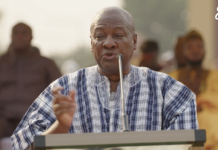
The former rector of the Ghana Institute of Management and Public Administration (GIMPA), Prof Stephen Adei, has pleaded with Ghanaians to forgive president Nana Akufo-Addo following revelations that portions of his inaugural speech were plagiarized.
Parts of Nana Addo’s speech were lifted from the inaugural addresses delivered by former US presidents, Bill Clinton and George Bush in 1993 and 2001.
At his investiture on Saturday, Akufo said: “Though our challenges are fearsome, so are our strengths. Ghanaians have been a restless, questing, hopeful people. And we must bring to our task today the vision and will of those who came before us.”
At his 1993 inauguration, ex-US President Bill Clinton said: “Though our challenges are fearsome, so are our strengths. And Americans have ever been a restless, questing, hopeful people. We must bring to our task today the vision and will of those who come before us.”
Also at his inauguration in 2001 George Bush said: “I ask you to be citizens: Citizens, not spectators; citizens, not subjects; responsible citizens building communities of service and a nation of character”.
Whilst the one delivered by Akufo-Addo to Ghanaians also read: “I ask you to be citizens: citizens, not spectators; citizens, not subjects; responsible citizens building your communities and our nation.”
The Minority in Parliament has demanded the immediate withdrawal of the president’s inaugural speech and also expunged from Parliamentary records with liberty to resubmit another speech not tainted with fraud and reflecting all attributable sources.
But speaking on Starr Chat on Wednesday, Prof. Adei said that the brouhaha that erupted following the plagiarism revelations are nothing, but a “distraction” from the main issues “we should be focusing on.”
“It is something which I think in academia it should not be tolerated but in this case it is excusable,” he opined.
That notwithstanding, he said the president’s speech writers had “embarrassed the president.”
The Communications director at the Presidency Eugene Arhin apologized for the gaffe attributing it to an “oversight.”
“I unreservedly apologise for the non-acknowledgement of this quote to the original author. It was a complete oversight, and never deliberate,” he said in a Facebook post.
Retired diplomat, Dr. K.B. Asante said he was not surprised as some of “these saying are such that…they are so good you are tempted to use them”.




